Mehdi Mabrouk | |
|---|---|
 Mahdi Mabrouk tunisian minister of culture | |
| Minister of Culture | |
| In office 20 December 2011 –Unknown | |
Mehdi Mabrouk is a Tunisian politician. He served as the Minister of Culture under Prime Minister Hamadi Jebali. [1] [2]
Mehdi Mabrouk | |
|---|---|
 Mahdi Mabrouk tunisian minister of culture | |
| Minister of Culture | |
| In office 20 December 2011 –Unknown | |
Mehdi Mabrouk is a Tunisian politician. He served as the Minister of Culture under Prime Minister Hamadi Jebali. [1] [2]
He has taught sociology at the University of Tunis, with lectures on illegal immigration and youth issues. [2] [3] He has also been a scholar at the Tunisian Center of Economic and Social Studies. [2] In June 2011, he said Tunisia was ill-equipped to handle the wave of immigration from Libya. [3]
Mabrouk is also the Chief of the Tunis Office of the Arab Center for Research and Policy Studies, and regularly speaks at some of its conferences. [4]
On 20 December 2011, after former President Zine El Abidine Ben Ali was deposed, he joined the Jebali Cabinet as Minister of Culture. [2] He has spoken at the Istanbul World Political Forum. [5]

Tunisia, officially the Republic of Tunisia, is the northernmost country in Africa. It is a part of the Maghreb region of North Africa, bordered by Algeria to the west and southwest, Libya to the southeast, and the Mediterranean Sea to the north and east. Tunisia also shares maritime borders with Italy through the islands of Sicily and Sardinia to the north and Malta to the east. It features the archaeological sites of Carthage dating back to the 9th century BC, as well as the Great Mosque of Kairouan. Known for its ancient architecture, souks, and blue coasts, it covers 163,610 km2 (63,170 sq mi), and has a population of 12.1 million. It contains the eastern end of the Atlas Mountains and the northern reaches of the Sahara desert; much of its remaining territory is arable land. Its 1,300 km (810 mi) of coastline includes the African conjunction of the western and eastern parts of the Mediterranean Basin. Tunisia is home to Africa's northernmost point, Cape Angela. Located on the northeastern coast, Tunis is the capital and largest city of the country, which is itself named after Tunis. The official language of Tunisia is Modern Standard Arabic. The vast majority of Tunisia's population is Arab and Muslim. Vernacular Tunisian Arabic is the most spoken, and French also serves as an administrative and educational language in some contexts, but it has no official status.

Tunisian culture is a product of more than three thousand years of history and an important multi-ethnic influx. Ancient Tunisia was a major civilization crossing through history; different cultures, civilizations and multiple successive dynasties contributed to the culture of the country over centuries with varying degrees of influence. Among these cultures were the Carthaginian – their native civilization, Roman, Vandal, Jewish, Christian, Arab, Islamic, Turkish, and French, in addition to native Amazigh. This unique mixture of cultures made Tunisia, with its strategic geographical location in the Mediterranean, the core of several civilizations of Mare Nostrum.
Internet censorship in Tunisia decreased in January 2011 following the ousting of President Zine El Abidine Ben Ali. The successor acting government removed filters on social networking sites, such as YouTube and Facebook.

Baghdadi Ali Mahmudi is a Libyan politician who was Secretary of the General People's Committee of Libya from 5 March 2006 to as late as 1 September 2011, when he acknowledged the collapse of the GPCO and the ascendance of the National Transitional Council as a result of the Libyan Civil War. He has a medical degree, specialising in obstetrics and gynecology, and had served as Deputy Prime Minister to Prime Minister Shukri Ghanem since 2003 at the time he was appointed to replace him. He was a part of Gaddafi's inner circle at least prior to his escape in mid-2011. He was arrested in Tunisia for illegal border entry and jailed for six months, although this was later overruled on appeal, however a Tunisian court decided to extradite Mahmoudi to Libya under a request from Libya's Transitional Council.

Tunis University is a public university in Tunis, Tunisia. It was founded in 1960 on the basis of earlier educational establishments.
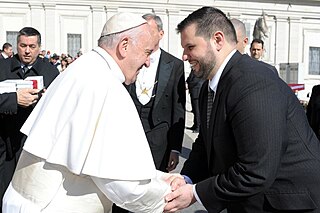
Dan Stoenescu is a Romanian career diplomat, political scientist and journalist. He was a minister in the technocratic government of Prime Minister Dacian Cioloș.

Mohamed Moncef Marzouki is a Tunisian politician who served as the fifth president of Tunisia from 2011 to 2014. Through his career he has been a human rights activist, physician and politician. On 12 December 2011, he was elected President of Tunisia by the Constituent Assembly.
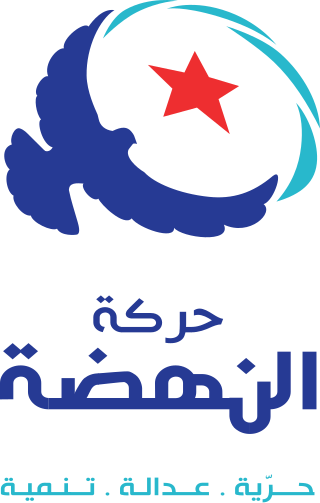
The Ennahda Movement, also known as the Renaissance Party or simply known as Ennahda, is a self-defined Islamic democratic political party in Tunisia.
The World Political Forum is a non-profit foundation, based in Turkey, best known for its annual meeting in Istanbul. The forum takes place with the participation of statesmen, CEOs, opinion leaders, bureaucrats and the business elite as well as renowned figures from reputable universities.

Samir Dilou is a Tunisian politician. He served as the Minister of human rights, transitional justice and government spokesperson under Prime Minister Hamadi Jebali.
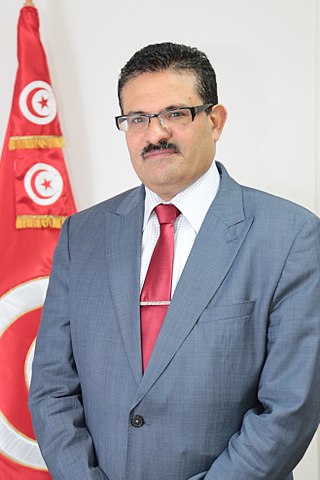
Rafik Bouchlaka is a Tunisian politician. He served as the minister of foreign affairs under Prime Minister Hamadi Jebali.

Moncef Ben Salem was a Tunisian politician and university professor. He served as the Minister of Higher Education and Scientific Research under Prime Minister Hamadi Jebali.
Abdellatif Abid is a Tunisian politician. He serves as the Minister of Education under Prime Minister Hamadi Jebali.
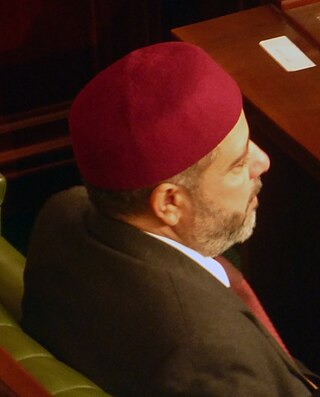
Nourredine Khadmi is a Tunisian politician. He served as the Religious Affairs under Prime Minister Hamadi Jebali.

Abdelwaheb Maatar is a Tunisian politician. He serves as the Minister of Training and Employment under Prime Minister Hamadi Jebali.

Khalil Zaouia is a Tunisian politician. He serves as the Minister of Social Affairs under Prime Minister Hamadi Jebali.

Abderrahman Ladgham is a Tunisian politician. He serves as the Deputy Prime Minister for Governance & Combating Corruption under Prime Minister Hamadi Jebali.

Mehdi Jomaa is a Tunisian engineer and was the acting Prime Minister of Tunisia from 29 January 2014 to 6 February 2015. He was chosen on 14 December 2013. Jomaa was Minister of Industry in the Ali Laarayedh government.
A political crisis evolved in Tunisia following the assassination of leftist leader Mohamed Brahmi in late July 2013, during which the country's mainly secular opposition organized several protests against the ruling Troika alliance that was dominated by Rashid al-Ghannushi's Islamist Ennahda Movement. The events came as part of the aftermath of the Tunisian Revolution which ousted the country's longtime president Zine El Abidine Ben Ali, followed by a general election which saw Ennahda win a plurality alongside Moncef Marzouki's allied Congress for the Republic (CPR). The crisis gradually subsided when Prime Minister Ali Laarayedh resigned and a new constitution was adopted in January 2014.
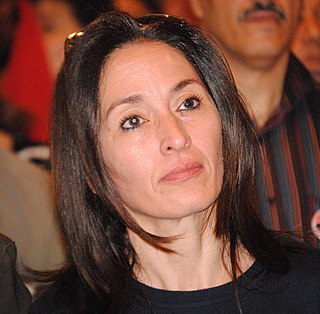
Selma Hédia Mabrouk is a secular Tunisian politician who served on the 2011 Tunisian Constituent Assembly as a representative of Ettakatol party for the Ben Arous district. She made international headlines when she revealed that the initial draft of the constitution was attempting to define women as a "complement with the man in the family, and an associate to the man in the development of the country." The revelation was shocking to Tunisian society, where women had achieved rights unknown in the rest of the Arab world, and caused immediate outrage. Mabrouk's social media posts were instrumental in having those passages struck from the final constitution.